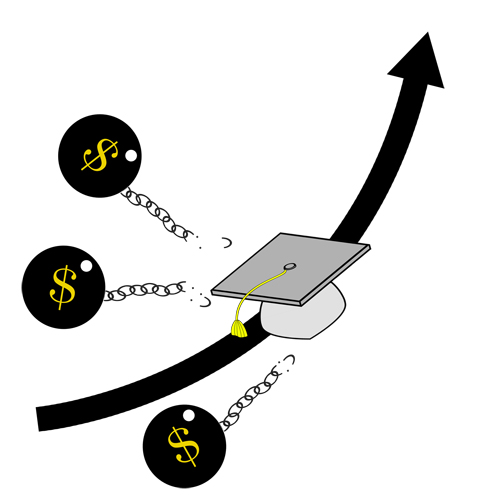What if you didn’t have to take out a loan to get through college? In fact, what if you didn’t have to worry about paying at all the whole time you were studying?
Pay it forward

What if you didn’t have to take out a loan to get through college? In fact, what if you didn’t have to worry about paying at all the whole time you were studying?
Some people think they don’t have to worry about it because they’ve taken out a bunch of loans and then learn the horrible truth when they’re faced with a pile of debt and ever-increasing interest rates the minute they throw their cap in the air. But if Oregon lawmakers have anything to do with it, this won’t be your reality.
The “Pay It Forward” bill was passed unanimously in the Oregon Legislature earlier this month. It proposes that students attend public universities tuition-free and loan-free. Then, when they finish their studies and enter the job market, they get 3 percent of their pay deducted from their paychecks for about 25 years.
This money would go into a fund that would cover the education of future students. Wait for the socialist conspiracy theorists!
The concept, developed by a nonprofit policy group called the Economic Opportunity Institute, is still being worked out, detail-wise—how to raise the initial startup money, for example, which would be about $9 million. That aside, the idea makes a lot of sense.
As it stands now, millions of students will be paying off debt until they die—or at the very least, into old age. What started off as a $20,000 education could well end up costing $50,000 or more the way interest rates are going. We’re in a hole and we can’t get out. Something has to give, and this may just be the answer.
OK, the thought of having your paycheck docked 3 percent on top of taxes isn’t fun—especially if your first job isn’t exactly helping you rake in the dough. However, it’s significantly less than what loan repayment would cost. Banks don’t really care how much you’re making. They just want their money back. No matter what kind of a job you get, you still have to cough it up.
The “Pay It Forward” plan would take your job into consideration. If you are unemployed for a while—which, sad to say, is a situation many new graduates find themselves in—you wouldn’t have to pay anything. It’s based on your income. No income, no bill.
Of course, this is probably where the bill will lose some people. There will inevitably be those who suggest that this wouldn’t be fair—that some people will get great jobs, and others won’t, and the former will end up paying a lot more.
It’s true. They will.
Say a graduate has a gross income of $800,000 over the next 24 years. They’d end up paying $24,000 for their four-year degree. Pretty reasonable. If someone makes $2 million over the same period, they’d pay $60,000. The billionaires among us would pay—perhaps we don’t want to go there. Let’s just say it’s a substantial difference.
The argument will no doubt be that all these people had the exact same education and one just paid almost triple the amount as the others. It’s the same old debate. We’re punishing people for making more money. Give me a break.
What if we chose to frame it slightly differently? What if we saw our secondary education as the privilege it is—one that a huge percentage of people on this earth don’t enjoy? And what if we saw it as our responsibility to ensure that as many of us received that privilege as possible, and viewed our education as an opportunity to invest in others?
I would feel honored and blessed if my success created success for someone else down the line. I wouldn’t see it as a punishment. It’d be a gift—one small way to make sure that the money I made wasn’t just feeding the unquenchable appetite of consumerism. Going through school without the weight of loans and then getting the chance to give back to someone else? Yes, please.
It’s a win-win situation and we’d be fools not to pursue it. Sure, it won’t be perfect and there will be hiccups along the way, but at least we could stop holding our breaths every time the government raises loan interest rates and just breathe.





